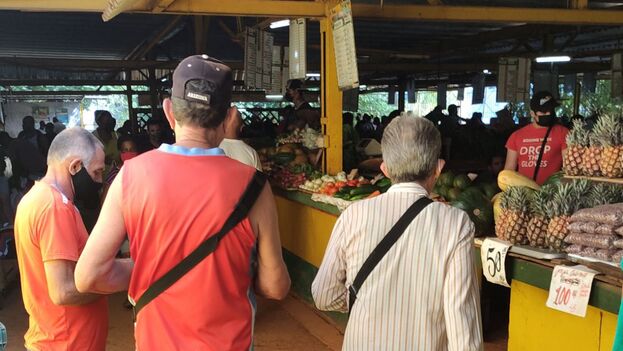
![]() 14ymedio, Madrid, 1 May 2023 — According to Cuban economist Pedro Monreal, official retail trade data on the island for 2022 offer a “devastating” panorama and remove “any vision of an alleged economic recovery underway”. The expert has analyzed the collection from the sale of food discounting inflation and the result could not be more discouraging: the drop is two-thirds compared to the previous year, a 2021 that was not exactly a good year.
14ymedio, Madrid, 1 May 2023 — According to Cuban economist Pedro Monreal, official retail trade data on the island for 2022 offer a “devastating” panorama and remove “any vision of an alleged economic recovery underway”. The expert has analyzed the collection from the sale of food discounting inflation and the result could not be more discouraging: the drop is two-thirds compared to the previous year, a 2021 that was not exactly a good year.
Monreal focuses exclusively in a thread of messages published this Monday on Twitter on food sales, and he does so precisely because, as he explains, “they are ‘inelastic’ goods, which in the language of economists means that demand tends not to be affected significantly due to price variations”, since people cannot stop eating and continue to buy, albeit in smaller quantities, whatever the price of the products.
“A two-thirds annual drop in ‘real’ retail food sales is no small matter […] and reveals an important dimension of the brutal ‘adjustment’ of consumption and aggregate purchasing power in Cuba”
At first sight and without discounting inflation, pasta, fish products, bread and a few other items seem to obey the “inelasticity” rule, since sales of the first item (pasta) have risen 85.5%, the second 14.8% and the third 2.9% in 2022, compared to the previous year. On the other hand, consumption of other products has suffered declines of up to 25.8% in the case of sugar or, even worse, 28.4% for milk derivatives.
The reality, however, is different and much more worrisome. When official inflation of 63% registered in 2022 is taken into account, we see that the value of pasta sales, which seemed to be in good health, have collapsed 31.4%, and this indicates an equivalent fall of real consumption by Cuban families. This resounding drop in consumption is reflected even more strongly in other foods: fish products (-57.5%), bread (-61.9%), rice (-63%), meat products (-69.8%), sugar (-72.5%) and milk derivatives (-73.5%).
“A two-thirds annual drop in ‘real’ retail food sales is no small matter […] and reveals an important dimension of the brutal ‘adjustment’ of consumption and aggregate purchasing power in Cuba, with the cost of adjustment focused on workers and retirees”, concludes Monreal.
____________
COLLABORATE WITH OUR WORK: The 14ymedio team is committed to practicing serious journalism that reflects Cuba’s reality in all its depth. Thank you for joining us on this long journey. We invite you to continue supporting us by becoming a member of 14ymedio now. Together we can continue transforming journalism in Cuba.
